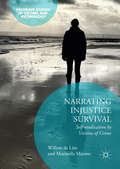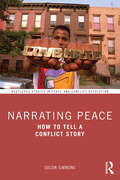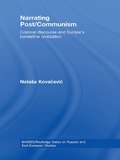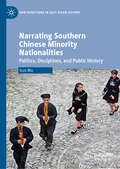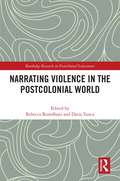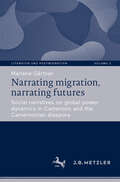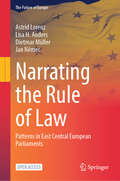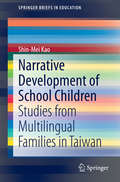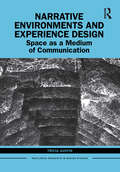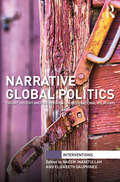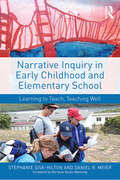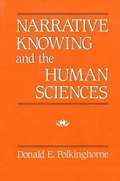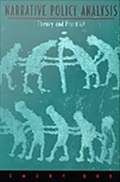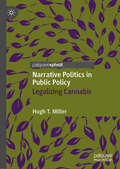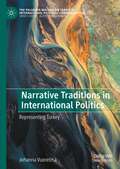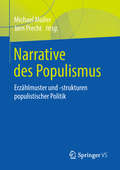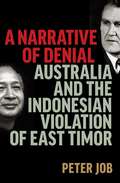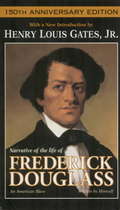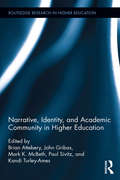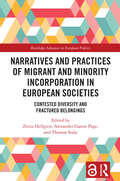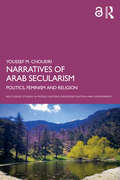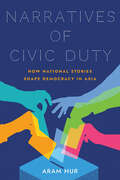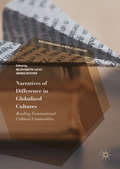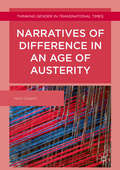- Table View
- List View
Narrating Injustice Survival: Self-medication by Victims of Crime (Palgrave Studies in Victims and Victimology)
by Willem De Lint Marinella MarmoThis book explores the role of self-medication in reflexive response to victimhood and victim recovery. Based on interviews, counsellor focus groups and a self-medication survey, it situates self-medication among the coping strategies that may be set in formal and informal networks. Victims primarily seek validation, and this book reviews self-medication with particular focus on how victim-survivors develop a variety of reflexive responses in their attempt to carve out a dignified response to victimization. Validation may be achieved through the pursuit of justice, but many victims suffer from multiple or complex victimisation, with limited social chances necessary to achieve a just outcome. Routines, beliefs and an ordered pathway distinguish a dignified identity and more or less successful recovery adaptations. This book also addresses the practical implications of the findings for support organisations.
Narrating Peace: How to Tell a Conflict Story (Routledge Studies in Peace and Conflict Resolution)
by Solon SimmonsThis book provides practical tools, models, and frameworks for thinking about how a story is structured, all in order to help us think about conflict. Using examples from literature and films for developing narrative competence in everyday life, the book illustrates a new model of four basic plot types that can push a reader/viewer either toward political struggle (a justice or vindication story) or toward a journey of self-realization (a peace or reconciliation story). The examples used in the book span a wide array of conflict situations, from climate change to native American genocide, from reproductive rights and gender-based violence to Algerian independence and Arab identity, from Jim Crow segregation and civil rights to the Vietnam War and colonial collapse, from Latino educational opportunities to the liberation of Bengal and the emergence of the idea of the Global South. This simple-to-use model of story grammar is integral for the practice of both politics and peacemaking and opens a new window on literary analysis and the craft of storytelling. Along the way, it provides us with a new way to understand human purpose and offers precise definitions of the concepts of peace and justice.This book will be of great interest to students and practitioners of international relations, security studies, political theory, and peace and conflict/justice studies.
Narrating Post/Communism: Colonial Discourse and Europe's Borderline Civilization (BASEES/Routledge Series on Russian and East European Studies)
by Natasa KovacevicThe transition of communist Eastern Europe to capitalist democracy post-1989 and in the aftermath of the Yugoslav wars has focused much scholarly attention - in history, political science and literature - on the fostering of new identities across Eastern European countries in the absence of the old communist social and ideological frameworks. This book examines an important, but hitherto largely neglected, part of this story: the ways in which the West has defined its own identity and ideals via the demonization of communist regimes and Eastern European cultures as a totalitarian, barbarian and Orientalist "other". It describes how old Orientalist prejudices resurfaced during the Cold War period, and argues that the establishment of this discourse helped to justify transitions of Eastern European societies to market capitalism and liberal democracy, suppressing Eastern Europe’s communist histories and legacies, whilst perpetuating its dependence on the West as a source of its own sense of identity. It argues that this process of Orientalization was reinforced by the literary narratives of Eastern European and Russian anti-communist dissidents and exiles, including Vladimir Nabokov, Czeslaw Milosz and Milan Kundera, in their attempts to present themselves as native, Eastern European experts and also emancipate themselves – and their homelands – as civilized, enlightened and Westernized. It goes on to suggest that the greatest potential for recognizing and overcoming this self-Orientalization lies in post-communist literary and visual narratives, with their themes of disappointment in the social, economic, or political changes brought on by the transitions, challenge of the unequal discursive power in East-West dialogues where the East is positioned as a disciple or a mimic of the West, and the various guises of nostalgia for communism.
Narrating Southern Chinese Minority Nationalities: Politics, Disciplines, and Public History (New Directions in East Asian History)
by Guo WuBased on fieldwork, archival research, and interviews, this book critically examines the building of modern Chinese discourse on a unified yet diverse Chinese nation on various sites of knowledge production. It argues that Chinese ideology on minority nationalities is rooted in modern China's quest for national integration and political authority. However, it also highlights the fact that the complex process of conceptualizing, investigating, classifying, curating, and writing minority history has been fraught with disputes and contradictions. As such, the book offers a timely contribution to the current debate in the fields of twentieth-century Chinese nationalism, minority policy, and anthropological practice.
Narrating Violence in the Postcolonial World (Routledge Research in Postcolonial Literatures)
by Daria Tunca Rebecca RomdhaniThis book examines representations of violence across the postcolonial world—from the Americas to Australia—in novels, short stories, plays, and films. The chapters move from what appear to be interpersonal instances of violence to communal conflicts such as civil war, showing how these acts of violence are specifically rooted in colonial forms of abuse and oppression but constantly move and morph. Taking its cue from theories in such fields as postcolonial, violence, gender, and trauma studies, the book thus shows that violence is slippery in form, but also fluid in nature, so that one must trace its movement across time and space to understand even a single instance of it. When analysing such forms and trajectories of violence in postcolonial creative writing and films, the contributors critically examine the ethical issues involved in narrating abuse, depicting violated bodies, and presenting romanticized resolutions that may conceal other forms of violence.
Narrating migration, narrating futures: Social narratives on global power dynamics in Cameroon and the Cameroonian diaspora (Literatur und Postmigration #2)
by Marlene GärtnerThe book revolves around narrative as an intriguing, as well as intricate object of analysis and demonstrates how theoretically sound and empirically founded narrative research can look like. Migration is imbued, motivated, and shaped by imagination. Based on the everyday language around migration in Cameroon, the author is exploring social narratives about migration and their relationship with the global. Migration storytelling is a cultural force which speaks about people and their lives to the fullest: What they aspire to, the risks they take, and the stories they tell about all of it.
Narrating the Rule of Law: Patterns in East Central European Parliaments (The Future of Europe)
by Astrid Lorenz Dietmar Müller Lisa H. Anders Jan NěmecThis open access book deals with the backsliding of the rule of law in Poland and Hungary as one of the main problems of the EU. What began as a national phenomenon has become a general threat for the EU because the respect for the rule of law is a prerequisite for all other values of the EU enshrined in Article 2 of the Treaty on European Union. Media coverage and scholarly publications on these developments mainly focus on backsliding governments and judicial decisions concerning the issue. This book aims to inform the debate by adding another perspective and providing a broader view. Drawing on a comprehensive collection of parliamentary debates, we explore how MPs in Poland, Hungary, but also the Czech Republic, Slovakia and Romania referred to the rule of law from 1990 to 2021 and how their narratives differed across parties, countries and time.
Narrative Development of School Children
by Shin-Mei KaoThis book reports the current aspects of children from multilingual families in Taiwan and describes these children's perceptions towards their linguistic, academic, and social development from a survey study and a discourse analysis study. The discourse analysis study focuses on the narrative developments of children born to Southeast Asian mothers versus average Taiwanese children across four grade levels in the elementary school. This book is significant in four aspects: describing the children with multilingual family background qualitatively and quantitatively, including a wide range and a large number of participants, proposing new analytical approaches for child narrative research, and compiling applicable classroom activities based on of research findings. The cultural and linguistic background of the children described in this book may be of interest to researchers and educators not only in Chinese-speaking regions, but also in areas where the phenomenon of multilingual family is becoming common in the society.
Narrative Environments and Experience Design: Space as a Medium of Communication (Routledge Research in Design Studies)
by Tricia AustinThis book argues narrative, people and place are inseparable and pursues the consequences of this insight through the design of narrative environments. This is a new and distinct area of practice that weaves together and extends narrative theory, spatial theory and design theory. Examples of narrative spaces, such as exhibitions, brand experiences, urban design and socially engaged participatory interventions in the public realm, are explored to show how space acts as a medium of communication through a synthesis of materials, structures and technologies, and how particular social behaviours are reproduced or critiqued through spatial narratives. This book will be of interest to scholars in design studies, urban studies, architecture, new materialism and design practitioners in the creative industries.
Narrative Global Politics: Theory, History and the Personal in International Relations (Interventions)
by Elizabeth Dauphinee Naeem InayatullahThis volume harnesses the virtual explosion of narrative writing in contemporary academic international politics. It comprises a prologue, an epilogue, and sixteen chapters that both build upon and diversify the success of the 2011 volume Autobiographical International Relations. Here, as in that volume, academics place their narratives in the context of world politics, culture, and history. Contributors explore moments in their academic lives that are often inexpressible in the standard academic voice and which, in turn, require a different way of writing and knowing. They write in the belief that academic IR has already begun to benefit from a different kind of writing—a stylae that retrieves the "I" and explicitly demonstrates its presence both within the world and within academic writing. By working within the overlap between theory, history, and autobiography, these chapters aim to increase the clarity, urgency, and meaningfulness of academic work. Highlighting the autoethnographic and autobiographic turn in critical international relations, this work will be of great interest to students and scholars in international relations, IR theory and global politics.
Narrative Inquiry in Early Childhood and Elementary School: Learning to Teach, Teaching Well
by Daniel R. Meier Stephanie Sisk-HiltonAs top-down educational reform policies at local and national levels increasingly isolate teachers from their own professional and instructional agency, and stultify children’s passion for learning, new techniques are needed for understanding and transforming educational practices. Narrative Inquiry in Early Childhood and Elementary School: Learning to Teach, Teaching Well facilitates meaningful change in early years education by providing early childhood and elementary school teachers with methods to incorporate narrative into their instruction and inquiry. This book offers practical strategies for incorporating narrative tools and structures into the classroom, and encouraging effective conceptual, pedagogical, and personal avenues for engaged teaching and learning across languages and cultures. The book’s chapters promote a lively discussion of central tenets of narrative inquiry and illustrative examples of teachers at work with narrative and inquiry for improving their practice and children’s learning.
Narrative Knowing and the Human Sciences
by Donald PolkinghorneThis book expands the concept of the nature of science and provides a practical research alternative for those who work with people and organizations. <p><p> Using literary criticism, philosophy, and history, as well as recent developments in the cognitive and social sciences, Narrative Knowing and the Human Sciences shows how to use research information organized by the narrative form―such information as clinical life histories, organizational case studies, biographic material, corporate cultural designs, and literary products. The relationship between the narrative format and classical and statistical and experimental designs is clarified and made explicit. Suggestions for doing research are given as well as criteria for judging the accuracy and quality of narrative research results.
Narrative Policy Analysis
by Practice TheoryNarrative Policy Analysis presents a powerful and original application of contemporary literary theory and policy analysis to many of today's most urgent public policy issues. Emery Roe demonstrates across a wide array of case studies that structuralist and poststructuralist theories of narrative are exceptionally useful in evaluating difficult policy problems, understanding their implications, and in making effective policy recommendations. Assuming no prior knowledge of literary theory, Roe introduces the theoretical concepts and terminology from literary analysis through an examination of the budget crises of national governments. With a focus on several particularly intractable issues in the areas of the environment, science, and technology, he then develops the methodology of narrative policy analysis by showing how conflicting policy "stories" often tell a more policy-relevant meta-narrative. He shows the advantage of this approach to reading and analyzing stories by examining the ways in which the views of participants unfold and are told in representative case studies involving the California Medfly crisis, toxic irrigation in the San Joaquin Valley, global warming, animal rights, the controversy over the burial remains of Native Americans, and Third World development strategies. Presenting a bold innovation in the interdisciplinary methodology of the policy sciences, Narrative Policy Analysis brings the social sciences and humanities together to better address real-world problems of public policy--particularly those issues characterized by extreme uncertainty, complexity, and polarization--which, if not more effectively managed now, will plague us well into the next century.
Narrative Politics in Public Policy: Legalizing Cannabis
by Hugh T. MillerThis book draws on examples from cannabis policy discourse and elsewhere to illustrate how individuals come to subscribe to a particular policy narrative; how policy narratives evolve; how narratives are employed in public policy discourse to compete with other narratives; and how, on implementation, the winning narrative is performed and subsequently institutionalized. Further, it explores how uncertainty and ambiguity are constants in public policy discourse, and how different factions and groups pursue different goals and aspirations. In the current climate of political reality, disputable facts and contestable goals, this book shows how different coalitions and ideologies use narratives to compete for policy dominance.
Narrative Traditions in International Politics: Representing Turkey (The Palgrave Macmillan Series in International Political Communication)
by Johanna VuorelmaThis book introduces the concept of narrative tradition to study representation in international politics. Focusing specifically on the case of Turkey, the book shows how narrative traditions are constructed, maintained, and passed on by a loose epistemic community that involves practitioners and experts including scholars, journalists, diplomats, and political representatives. Employing an interpretative approach, the book distinguishes between four narrative traditions in the study of Turkey: Turkey as a state that is (1) getting lost, (2) standing at a decisive crossroad, (3) led by strongmen, and (4) struggling with a creeping Islamisation.These narrative traditions carry enduring beliefs that not only describe, moralise, judge, and stigmatise Turkey, but also contribute to the idea of the West. The book focuses on knowledge that is produced from a Western perspective, showing that Turkey provides a channel through which the Western self can be debated, challenged, celebrated, and judged.
Narrative des Populismus: Erzählmuster und -strukturen populistischer Politik
by Michael Müller Jørn PrechtPopulistische Ideologeme und populistische Kommunikation beruhen auf Narrativen, also erzählerischen Grundmustern, die gesellschaftliche Denkmuster abbilden. Eine narrative Analyse dieser Muster führt zu einem besseren Verständnis des Phänomens des Populismus. In diesem Band setzen sich die Autoren mit diesen Erzählmustern und -strukturen populistischer Politik auseinander und stellen die Frage nach dem Zusammenhang politischer und medialer Diskurse im thematischen Feld des Populismus.Der InhaltPopulismus - Versuch einer begrifflichen Differenzierung • Umrisse des populistischen Narrativs als Identitätspolitik • Narrative der Demokratie • Volkserzählungen • Eklektizismus populistischer Narrative • Populistische Narrative im sozialen Netzwerk • Erzählformen des Populismus • Populismus in den LeitmedienDie HerausgeberDr. Michael Müller ist Professor für Medienkonzeption und Medienanalyse, Semiotik und Erzähltheorie. Er leitet das Institut für Angewandte Narrationsforschung (IANA) der Hochschule der Medien in Stuttgart.Jørn Precht ist Professor für Transmediales Storytelling, Dramaturgie und Stoffentwicklung für AV- und Online-Medien an der Hochschule der Medien in Stuttgart und leitet dort das Institut für Angewandte Narrationsforschung (IANA).
Narrative of Denial: Australia and the Indonesian Violation of East Timor
by Peter JobThe Indonesian invasion of East Timor in 1975 led to a prolonged conflict, severe human rights abuses and a large loss of life. From 1975 to 1983 the Indonesian military's campaign of 'encirclement and annihilation' destroyed rural food resources, creating the famine that took most of the lives lost during the occupation. The Australian governments of Gough Whitlam and Malcolm Fraser presented themselves as advocates for human rights and the international rule of law, while viewing relations with Indonesia as key to their foreign policy objectives. These positions came into conflict due to the Indonesian invasion of East Timor. Based upon an extensive study of Australian foreign affairs archives, as well as interviews, A Narrative of Denial demonstrates how the Australian government responded to the conflict by propagating a version of events that denied the reality of the catastrophe occurring in East Timor. It worked to protect the Suharto regime internationally, thereby allowing it to continue its repression relatively unhindered. This remarkable story will unsettle existing perceptions of how Australia operates in world affairs.
Narrative of the Life of Frederick Douglass: An American Slave (Text Connections)
by Frederick Douglass Henry Louis GatesThis dramatic autobiography of the early life of an American slave was first published in 1845, when its young author had just achieved his freedom. Douglass' eloquence gives a clear indication of the powerful principles that led him to become the first great African-American leader in the United States.
Narrative, Identity, and Academic Community in Higher Education (Routledge Research in Higher Education)
by Brian Attebery John Gribas Paul Sivitz Kandi Turley-Ames Mark K. McBethGrounded in narrative theory, this book offers a case study of a liberal arts college’s use of narrative to help build identity, community, and collaboration within the college faculty across a range of disciplines, including history, psychology, sociology, theatre and dance, literature, anthropology, and communication. Exploring issues of methodology and their practical application, this narrative project speaks to the construction of identity for the liberal arts in today’s higher education climate. Narrative, Identity, and Academic Community focuses on the ways a cross-disciplinary emphasis on narrative can impact institutions in North America and contribute to the discussion of strategies to foster bottom-up, faculty-driven collaboration and innovation.
Narratives and Practices of Migrant and Minority Incorporation in European Societies: Contested Diversity and Fractured Belongings (Routledge Advances in European Politics)
by Thomas Sealy Zenia Hellgren Alexander Gamst PageThis book explores the disjuncture that emerges at various levels in European diversity management policies and their translation into practice.It shows that state-wide strategies can only guide diversification outcomes, not wholly control them, and in practice, national level integration policies rely on multi-level involvement including authorities at regional or local levels and civil society organisations. The book demonstrates a complex and varied picture of the ways in which different European countries engage with ethnic diversity, as well as to the internal (in)consistency of the philosophical underpinnings of this engagement. As such, it draws attention not just to ways in which diversity "is done," but illuminates processes and narratives which are messy, contested, and contradictory.This book is of key interest to scholars, students, and practitioners involved in integration, ethnic and cultural diversity studies, migration and immigration, citizenship, ethnicity, and more broadly to European studies, and the wider social sciences.
Narratives of Arab Secularism: Politics, Feminism and Religion (Routledge Studies in Middle Eastern Democratization and Government)
by Youssef M. ChoueiriThis book offers a new interpretation of the rich narratives of Arab secularism, contending that secularism as a set of ideas and a social movement is destined to loom large on the political and legal horizon of most Arab states. Youssef M. Choueiri provides a study of three moments in the development of secularism in the Arab World, the Machiavellian, the Alfierian and the Gramscian. It is within such a scope that secularism in its interaction with state-building projects, women’s emancipation and religion is treated as an intellectual current and a discursive entity embedded in the political process of its diverse societies. Through the chapters, Choueiri demonstrates how secularism occupies a pivotal presence in the religious and political life of the Arab world, exploring such interrelated configurations as indigenous contributions, diverse reforms and the impact of Western states. He concludes that secularism has become a moral prerequisite and a required vehicle in creating the necessary conditions for the success of democracy in the Middle East. Narratives of Arab Secularism tackles the complexity and contemporary ramifications of the subject in a way that no previous single study has been able to. It will be relevant to both students and academics dealing with topics related to the Middle East including religion, politics, anthropology and history.
Narratives of Arab Secularism: Politics, Feminism and Religion (Routledge Studies in Middle Eastern Democratization and Government)
by Youssef M. ChoueiriThis book offers a new interpretation of the rich narratives of Arab secularism, contending that secularism as a set of ideas and a social movement is destined to loom large on the political and legal horizon of most Arab states.Youssef M. Choueiri provides a study of three moments in the development of secularism in the Arab World, the Machiavellian, the Alfierian and the Gramscian. It is within such a scope that secularism in its interaction with state-building projects, women’s emancipation and religion is treated as an intellectual current and a discursive entity embedded in the political process of its diverse societies. Through the chapters, Choueiri demonstrates how secularism occupies a pivotal presence in the religious and political life of the Arab world, exploring such interrelated configurations as indigenous contributions, diverse reforms and the impact of Western states. He concludes that secularism has become a moral prerequisite and a required vehicle in creating the necessary conditions for the success of democracy in the Middle East.Narratives of Arab Secularism tackles the complexity and contemporary ramifications of the subject in a way that no previous single study has been able to. It will be relevant to both students and academics dealing with topics related to the Middle East including religion, politics, anthropology and history.Chapter 6 of this book is freely available as a downloadable Open Access PDF at http://www.taylorfrancis.com under a Creative Commons Attribution-Non Commercial-No Derivatives (CC-BY-NC-ND) 4.0 license.
Narratives of Civic Duty: How National Stories Shape Democracy in Asia (Studies of the Weatherhead East Asian Institute, Columbia University)
by Aram HurIn Narratives of Civic Duty, Aram Hur investigates the impulse behind a sense of civic duty in democracies. Why do some citizens feel a responsibility to vote, pay taxes, or take up arms in defense of one's country? Through comparing democratic societies in East Asia and elsewhere, Hur shows that the sense of obligation to be a good citizen—upon which the resilience of a democracy depends—emerges from a force long thought to be detrimental to democracy itself: national attachments.Nationalism's illiberal and exclusive tendencies are typically viewed as disruptive to democratic processes, but Hur argues that there is nothing inherently antidemocratic about nationalism. Rather, whether nationalism helps or hinders democracy is shaped by the historicized relationship between a national people and their democratic state. When national stories portray that relationship as one of mutual commitment, nationalism strengthens democracies by motivating widespread civic duty among citizens. Drawing on personal narratives, statistical surveys, and experiments, Narratives of Civic Duty offers a provocative national theory of civic duty that cuts to the heart of what makes democracies thrive.
Narratives of Difference in Globalized Cultures
by Belén Martín-Lucas Andrea RuthvenThis book is about how the marketing of transnational cultural commodities capitalizes on difference and its appeal for cosmopolitan consumers in our postmodern globalized world. At what price? What ethical and political conundrums does the artist/writer/reader confront when going global? This volume analyzes why difference - whether gender, sexual, racial, ethnic, or linguistic - has become such a prominent element in the contemporary cultural field, and the effects of this prevalence on the production, circulation and reception of cultural commodities in the context of globalization. At the intersection of globalization, diaspora, postcolonial and feminist studies in world literature, these essays engage critically with a wide variety of representative narratives taken from diverse cultural fields, including humanitarian fiction, multilingual poetry, painting, text-image art, performance art, film, documentary, and docu-poetry. The chapters included offer counter-readings that disrupt hegemonic representations of cultural identity within the contemporary, neoliberal and globalized landscape.
Narratives of Difference in an Age of Austerity
by Irene GedalofThis book traces the narrative strategies framing austerity policies through an illuminating analysis of policy documents and political discourses, exposing the political consequences for women, racialized minorities and disabled people. While many have critiqued the ways in which austerity has captured the contemporary political narrative, this is the first book to systematically examine how these narratives work to shift the terms within which policy debates about inequality and difference play out. Gedalof's exceptional readings of these texts pay close attention to the formal qualities of these narratives: the chronologies they impose, their articulation of crisis and resolution, the points of view they construct and the affective registers they deploy. In this manner she argues persuasively that the differences of gender, race, ethnicity and disability have been stitched into the fabric of austerity as excesses that must be disavowed, as reproductive burdens that are too great for the austere state to bear. This innovative, intersectional analysis will appeal to students and scholars of social policy, gender studies, politics and public policy.
